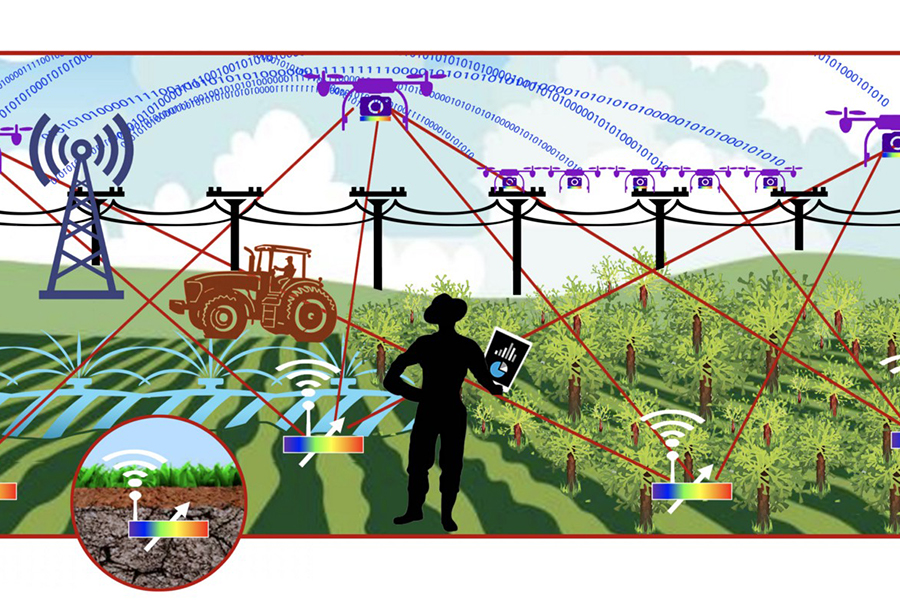
IoT4Ag researchers will work in three interconnected projects: sensing, communication/energy and response. Tiny, plantable sensors will need to send data to robots and other farm equipment, all of which also will need to be able to talk to the cloud. Finally, all of this data must be integrated with that from the wider internet and fed back to farmers so they can make better decisions.
Illustration credit: Julie Colton

IoT4Ag researchers will work in three interconnected projects: sensing, communication/energy and response. Tiny, plantable sensors will need to send data to robots and other farm equipment, all of which also will need to be able to talk to the cloud. Finally, all of this data must be integrated with that from the wider internet and fed back to farmers so they can make better decisions.
Illustration credit: Julie Colton
full story additional photos/animations
Purdue University will be a partner in a new National Science Foundation Engineering Research Center created to develop advanced agricultural technologies to address food, energy and water security challenges.
With a five-year, $26 million grant, the NSF has established the Engineering Research Center for the Internet of Things for Precision Agriculture (IoT4Ag). Engineering Research Centers (ERCs) are NSF’s flagship engineering program for convergent research to address large-scale societal challenges.
The new center, headquartered at the University of Pennsylvania’s School of Engineering and Applied Science, will combine the talents of more than two dozen researchers with Penn Engineering, Purdue University, the University of California, Merced, and the University of Florida.
“Participation on the IoT4G team will leverage Purdue’s strengths in developing new engineering technologies that will improve agriculture and address global challenges,” said Mark Lundstrom, acting dean of Purdue University’s College of Engineering. “Our involvement will also represent a new chapter in a long history of collaboration between the colleges of Engineering and Agriculture.”
Karen Plaut, Purdue’s Glenn W. Sample Dean of the College of Agriculture, says: “This center allows us to continue our long-standing collaboration with the College of Engineering to build critical foundational tools for agriculture. This work continues on the success of the Plant Sciences Initiative and enhances the ability of the WHIN project, a consortium of 10 counties in north-central Indiana, to harness the power of IoT to become a global epicenter for digital agriculture.”
David J. Cappelleri, associate professor of mechanical engineering, will serve as co-principal investigator, Purdue site director and workforce development co-lead for IoT4Ag.
Starting in the soil and reaching into the digital cloud, technologies developed through the IoT4Ag ERC will collect, share and analyze data in order to improve farming practices, maximizing a farm’s productivity while minimizing its waste and ecological impact.
Center researchers will create miniature soil-based sensors and swarms of aerial and ground-based robots, as well as new ways of networking them together in communication-constrained environments. The researchers also will develop high-level data science techniques that will allow data from different sensors in the field to be integrated with data from weather reports and commodity markets, synthesizing it into actionable information.
Part of the ERC mandate is to converge a wide range of academic disciplines in tackling these challenges. Another is to develop a diverse and inclusive workforce from across the United States. By partnering with industry and a broad community of students, faculty and professionals, the IoT4Ag Center will create an innovation ecosystem to continue these efforts into the coming decades.
Collectively, the IoT4Ag Center will educate students, engineers, agriculture professionals and other members of farming communities through audience-specific lessons and hands-on classroom, laboratory and field activities.